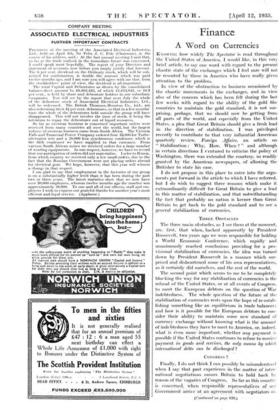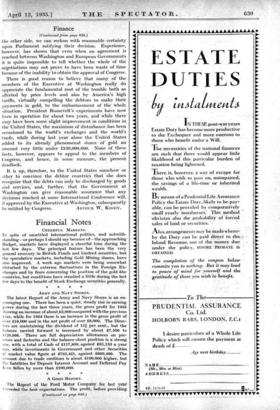Finance
A Word on Currencies
KNOWING how widely The Spectator is read throughout the United States of-America, I would like, in this very brief article, to say one- word with regard to the present chaotic state of the exchanges which I feel sure will not be resented by those in America who have really given attention to the problem.
In view of the obstruction to business occasioned by the chaotic movements in the exchanges, and in view also of the concern which has been felt during the last few weeks with regarct to the ability of the gold bloc countries to maintain the gold standard, it is not sur- prising, perhaps, that we should now be getting from all parts, of the world, and especially from the United States, a plea that Great Britain should give a fresh lead in the direction of stabilization. I was privileged recently to contribute to that very influential American quarterly review, Foreign Affairs, an article on " Stabilization : Why, How, When ? " and although in certain. directions I ventured to criticize the policy of Washington, there was extended the courtesy, 'so readily granted by the American newspapers, of allowing the Britisher to state his case.
I do not propose in this place to enter into the argu- ments put forward in the article to which I have referred, but I do wish to suggest three reasons which make it extraordinarily difficult for Great Britain to give a lead in this matter of stabilization, and that notwithstanding the fact that probably no nation is keener than Great Britain to get back to the gold standard and to see a general stabilization of currencies.
THREE OBSTACLES
The three main Obstacles, as I see them at the moment, arc, first, that when, backed apparently by President Roosevelt, two years ago we were responsible for holding a World Economic Conference, which rapidly and unanimously reached conclusions providing for a pro- visional stabilization of currencies, the idea was turned down by. President Roosevelt in a manner which sur- prised and disheartened some of his own representatives, as it certainly did ourselves, and the rest of the world.
The second point which seems to me to be completely blocking the way for-any stabilization of currencies is the refusal of the United States, or at all events of Congress, to meet the European debtors on the question of War indebtedness. The whole question of the future. of the stabilization of currencies rests upon the hope of re-estab- lishing something like an equilibrium in trade balances; and how is it possible for the European debtors to con- sider their ability to maintain some new standard of currency exchange without knowing what is the amount of indebtedness they have to meet to America, or, indeed, what is 'e'ven more important, whether any payment is possible if the United States continues to refuse to receive payment in goods and services, the only means by which • international debts can be discharged?
CONGRESS ?.
Finally, I do not think I can possibly- be misunderstood when I say that past experience in the matter of inter- national negotiations causes Britain to hold back by reason of the vagaries of Congress. So far as this country is concerned, when responsible. 'representatives of out Government arrive at an agreement with negotiators on (Continued on page 639.) -
Finance
(Continued from page 638.) the other side, we can reckon with reasonable certainty upon Parliament ratifying their decision. Experience, however, has shown that even when an agreement is reached between Washington and European Governments it is • quite impossible to tell whether the whole 'Of the negotiations may not prove to have. been Waste of time because of the inability-to- obtain the approval of Congress.
There is good reason to believe that many of the members of the Executive -at Washington really do appreciate the fundamental root of the trouble both as affected by price levels and also by Anaerica's high tariffs, virtually compelling the debtors to make their payments in gold, to the embarrassment of the whole situation. President RooseVelt's experiments have now been in opefation for about two years, and while there' may have been some slight improvement in conditions in the United States; the maximum of distiirbanee has been occasioned to the world's -exchanges and the world's trade,. while during last year alone the United States added to its already phenomenal stores- of gold an amount very little under 1240,000,000. None Of these facts, however; appears to appeal to the Members of Congress, and hence, in 'some measure, the 'present deadlock; It is up, therefore, to the United States somehow or other to convince the debtor countries " that she does
I'
recognize that the debts can only be discharged by goods and services; and, further, that the Governnient at Washington can give reasonable assurance that any • decisions reached at some ,International Conference will, , if approved by the Executive at Washington, subsequently



















































 Previous page
Previous page